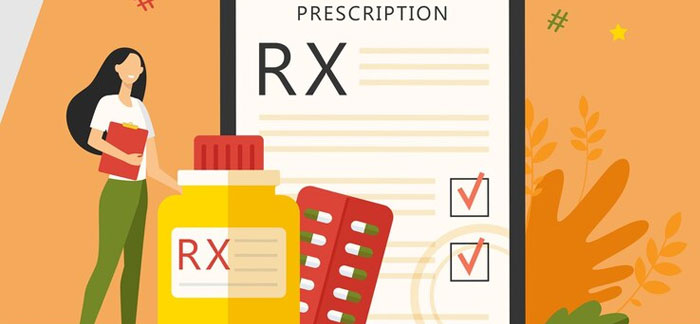Take charge of your health with our prescription FAQs – all the answers you need in one place.
Looking to understand more about prescription medication? Here are 30 common questions that people ask about, written by a doctor. These include questions about the purpose, how long it takes for a prescription to start working, possible side effects, and how to properly store medication. Other topics include taking medication with other medications, being pregnant or breastfeeding while taking medication, and what to do if you miss a dose or experience an allergic reaction. Additionally, we cover issues related to refilling prescriptions, switching to a generic version, and how to handle expired medication. If you want to know more about it, keep reading!

This is a healthcare provider’s written order authorizing specific medical treatment. It serves as a necessary document for obtaining the required medication or therapy.
The onset of effectiveness for a prescribed treatment can vary depending on the specific therapy and the individual’s condition.
Your healthcare provider determines the duration of your prescribed medicine. Follow their guidance for optimal effectiveness. Complete the full course as prescribed. Avoid altering the duration without consulting them. Ask questions for better understanding.
Complete prescribed treatment. Don’t stop if feeling better. Consult the healthcare provider before discontinuing.
Side effects may include nausea, headache, dizziness, fatigue, and diarrhea.
For the best outcomes and to avoid potential interactions, it is recommended to refrain from consuming alcohol while undergoing your prescribed treatment.
It is crucial to consult your healthcare provider before taking your prescribed medicine alongside other drugs you are currently using. They can evaluate potential interactions and provide guidance on whether it is safe to combine medications. Mixing drugs without proper medical advice can lead to adverse effects or reduced effectiveness of the treatment. Your healthcare provider will consider factors such as drug interactions, dosage adjustments, and your specific medical condition to ensure your safety and optimize the effectiveness of your prescribed medicine.
Prior to taking medication while pregnant or breastfeeding, consult your healthcare provider. They will evaluate risks, assess alternatives, and offer recommendations to protect the health of both you and your baby.
To store your prescribed treatment properly, follow these guidelines:
By adhering to these storage guidelines, you can maintain the effectiveness and safety of your prescribed treatment.
Before crushing or cutting your prescribed drug, it is important to consult your healthcare provider or pharmacist. Certain medications are formulated in a specific way to ensure proper absorption or release of the active ingredients. Modifying the medication by crushing or cutting can affect its effectiveness or cause potential harm. Your healthcare provider or pharmacist can provide guidance on appropriate administration methods or recommend alternative dosage forms if needed. Always seek professional advice before altering your prescribed drug.
If you miss a dose of your prescribed medication, follow these steps:
Remember, adhering to the prescribed dosing schedule is important for the effectiveness and safety of your medication.
Yes, you can generally take your prescribed treatment on an empty stomach. However, it’s important to carefully read the instructions provided with your medication or consult your healthcare provider for specific guidelines. Some medications may need to be taken with food to enhance absorption or reduce potential side effects. It’s always best to follow the recommended instructions for optimal effectiveness and safety.
You can gauge the effectiveness of your prescribed medicine by observing changes in your symptoms. Pay attention to any improvements or relief you experience in relation to the condition being treated. It may take time for certain medications to take full effect, so it’s important to follow the prescribed dosage and duration. If you have concerns or are unsure about the progress, it’s advisable to consult your healthcare provider for further evaluation and guidance.
Yes, you can conveniently request a refill for your prescribed treatment through various methods, such as over the phone or online. Many pharmacies offer services that allow you to call or submit refill requests through their website or mobile applications. It’s a convenient way to save time and ensure a seamless continuation of your treatment. Make sure to have the necessary prescription information readily available when contacting the pharmacy to expedite the process.
If you experience an allergic reaction to your prescribed drug, it is crucial to take immediate action. Stop taking the medication and seek medical attention promptly. Contact your healthcare provider or go to the nearest emergency room if the symptoms are severe or life-threatening. It’s important to communicate the details of the allergic reaction to your healthcare provider, including the specific symptoms and when they started. They will evaluate the situation, provide necessary treatment, and determine alternative medications or treatment options to avoid future allergic reactions.
In many cases, it is possible to switch to a generic version of your prescribed treatment. Generic medications contain the same active ingredients as their brand-name counterparts and are generally considered equally effective. However, it’s important to consult your healthcare provider or pharmacist before making any changes. They can provide guidance based on your specific medication, medical history, and individual circumstances. They will consider factors such as therapeutic equivalence, potential differences in formulations, and any specific considerations related to your condition. Always follow the recommendations of your healthcare provider or pharmacist when considering a switch to a generic version of your prescribed treatment.
Yes, you can ask your healthcare provider if a different dose or strength of your prescribed medication is suitable for you. They will assess your medical condition and make recommendations based on their clinical judgment and the available options.
It depends on your insurance and the treatment you’re prescribed. Consult your doctor or pharmacist.
Contact your doctor or pharmacist as soon as possible for possible solutions.
It’s allowed but uncommon. Discuss with your doctor the reasons and potential risks or benefits.
It depends on the treatment and your specific health condition. Discuss potential risks and benefits with your doctor.
Yes, you can still get it for a drug not covered by your insurance. However, you may need to pay out of pocket for the medication or explore alternative options.
Yes, you can still get it even if you don’t have health insurance. However, you will have to pay for the medicine out of pocket or explore options such as free clinics or prescription assistance programs.
It depends on the medicine and the laws in the state where you are located. Some treatments may require a prescription from a doctor licensed in the state where you are located. It’s best to check with your doctor or a local pharmacist to see if you can get a prescription filled while out of town.
Yes, you can get it from a different doctor if your usual provider is not available. However, it’s important to inform the new doctor about your medical history and current treatments to ensure safe prescribing.
Yes, you can still get it if you don’t have a regular doctor. You can visit a walk-in clinic, or urgent care center, or consult a telemedicine provider to get a prescription.
Check the expiration date on the label or packaging of the treatment. Most medicines have a shelf life of 1-5 years from the date they are manufactured.
It’s best to dispose of expired treatments properly to prevent misuse or accidental ingestion. Follow the instructions on the label or check with your local pharmacy for proper disposal methods.
Some doctors may offer telemedicine appointments where they can prescribe treatment after a virtual consultation. However, it’s important to ensure that the doctor is licensed and reputable before obtaining a prescription online or over the phone.
It should be written by a licensed doctor and filled at a licensed pharmacy. Check the label and packaging of the treatment for the drug name, dosage, and expiration date. If you have any concerns about the safety or legality of your prescription, you can check with your doctor or pharmacist.
We wanted to let you know that the list of questions on this page is based on the most frequently asked questions we have received from over 1000 people. Replying to the same question multiple times for different people was quite tiring for us. So, we decided to compile a page with all of these questions to make it easier for everyone to find answers to their prescription-related questions.
We understand that prescription medications can be confusing and cause concerns. That’s why we have gathered this comprehensive list of common questions. We hope that this page has helped to answer some of your questions and provided you with the necessary information to make informed decisions about your medication.
But always remember to consult with your healthcare provider about any questions or concerns you may have about your prescription medication. Your health is important, so stay informed and take care of yourself!